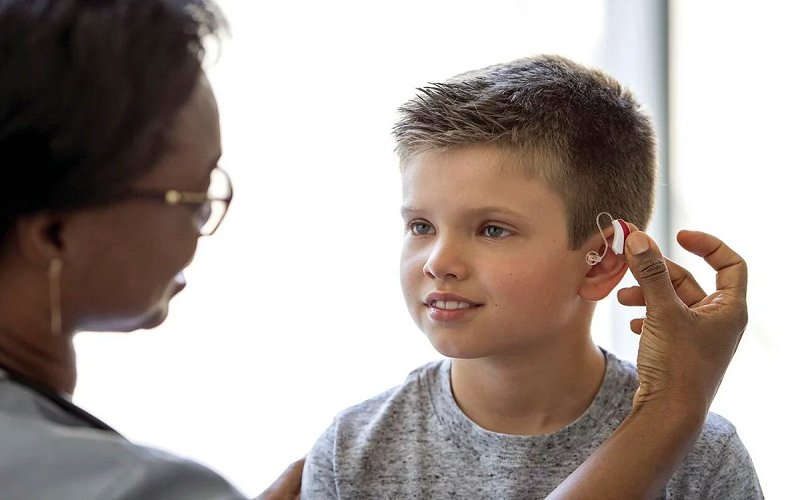Hearing Aid Maintenance 101: Tips for Optimal Performance

Hearing aids are extremely useful gadgets that improve the auditory experience for people who have hearing loss. Regular maintenance is required to guarantee that these devices continue to operate at peak efficiency. In this article, we will go over Hearing Aid Maintenance 101, offering useful ideas to help users maintain the performance and longevity of their devices.
Daily Cleaning Routine
A daily cleaning practice is the foundation of proper hearing aid care. Use a soft, dry cloth to carefully wipe off the hearing aids’ exterior, eliminating any accumulated wax, debris, or moisture. Pay special attention to the microphone ports and vents, ensuring that they are clear for best operation.
Invest in a Cleaning Kit
Consider purchasing a specialised cleaning kit made for hearing aids. These kits frequently include cleaning brushes, wax-removing equipment, and air blowers. Regular use of these instruments helps reach complicated portions of the hearing aids, reducing wax buildup that could impair their operation.
Avoid Moisture Exposure
Moisture is a typical opponent to hearing aids. To reduce moisture exposure, remove your hearing aids before washing, swimming, or indulging in activities that may cause excessive sweat. When not in use, keep your hearing aids in a protected case or dehumidifier intended for hearing aid maintenance.
Change your Batteries on a Regular Basis
For hearing aids that use disposable batteries, it is critical to create a battery replacement schedule. Maintain a supply of replacement batteries and replace them on a regular basis to avoid unexpected outages. Dispose of old batteries safely, and if your hearing aid model allows for rechargeable options, explore them.
Handle with Clean Hands
Always keep your hearing aids in clean hands. Before inserting or removing them, carefully clean your hands to avoid spreading dirt, oils, or other pollutants to the devices. Clean hands help your hearing aids last longer and preserve general hygiene.
Protect against Physical Damage
Hearing aids are fragile electrical equipment that must be protected against physical damage. Avoid dropping them and keep them in a secure location when not in use. Consider using a protective case to keep your gadgets safe from accidental bumps, scratches, and falls.
Regular Hearing Aid Checks
Schedule regular exams to ensure your hearing aids are functioning properly. Test each device to confirm that the sound is clear and constant. If you detect any problems, such as distorted sound or feedback, it may be time to seek expert help. Seeking hearing aid repairs and servicing from an audiologist might help you resolve these concerns quickly.
Maintain a Battery Storage Case
If you use throwaway batteries, consider investing in a battery storage container. This case helps to preserve spare batteries in good condition by shielding them from moisture and other environmental influences. Batteries that are correctly stored retain their charge and work reliably when needed.
Professional Cleaning and Checks
While frequent at-home care is essential, professional cleaning and audiology checks are also necessary. Schedule regular professional maintenance appointments so that audiologists can perform complete examinations, clean hard-to-reach components, and treat any potential issues that may go undetected during ordinary at-home care.
Stay Informed about Software Updates
If your hearing aids include software, keep up with any upgrades given by the manufacturer. These updates may include enhancements to functionality, new features, or bug fixes. Updating your hearing aid software guarantees that you take advantage of the most recent technological breakthroughs.
Educate yourself on Troubleshooting
Learn how to troubleshoot typical issues with hearing aids. Knowing how to deal with minor concerns, such as distorted sound or connectivity problems, can help you avoid unnecessary delays in using your hearing aid. For effective troubleshooting tips, refer to your user handbook or consult with your audiologist.
Store in a Dry Environment
Moisture is a known enemy of hearing aids; therefore, keeping them in a dry environment is critical. When not in use, keep your hearing aids in a dedicated drying or storage container, particularly overnight. This procedure helps to absorb any remaining moisture and guarantees that your electronics are ready to use the next day.
Protect Against Ear Wax Accumulation
Earwax can collect on hearing aids, reducing their performance. To keep your hearing aids clear, check for wax buildup on a regular basis and utilise the wax removal tools included with cleaning kits. If you have recurring earwax problems, see your audiologist for advice on preventative and removal strategies.
Educate yourself on Battery Care
If rechargeable batteries power your hearing aids, learn how to care for them properly. Follow the manufacturer’s charging cycle recommendations and prevent overcharging the batteries. Understanding how to care for rechargeable batteries ensures that they last and work consistently.
Store Away from Pets and Children
Hearing aids are small and may provide choking hazards for pets and children. When not in use, keep your hearing aids in a safe place out of the reach of curious hands or paws. This measure not only protects the equipment but also safeguards the safety of individuals nearby.
Conclusion
Hearing aid care is an essential part of assuring peak performance and lifetime. By implementing these ideas into your everyday routine, you can improve the operation of your hearing aids while reducing the chance of problems. Regular checkups, skilled hearing aid repair and servicing, and a proactive approach to maintenance all contribute to a positive and continuous auditory experience.
